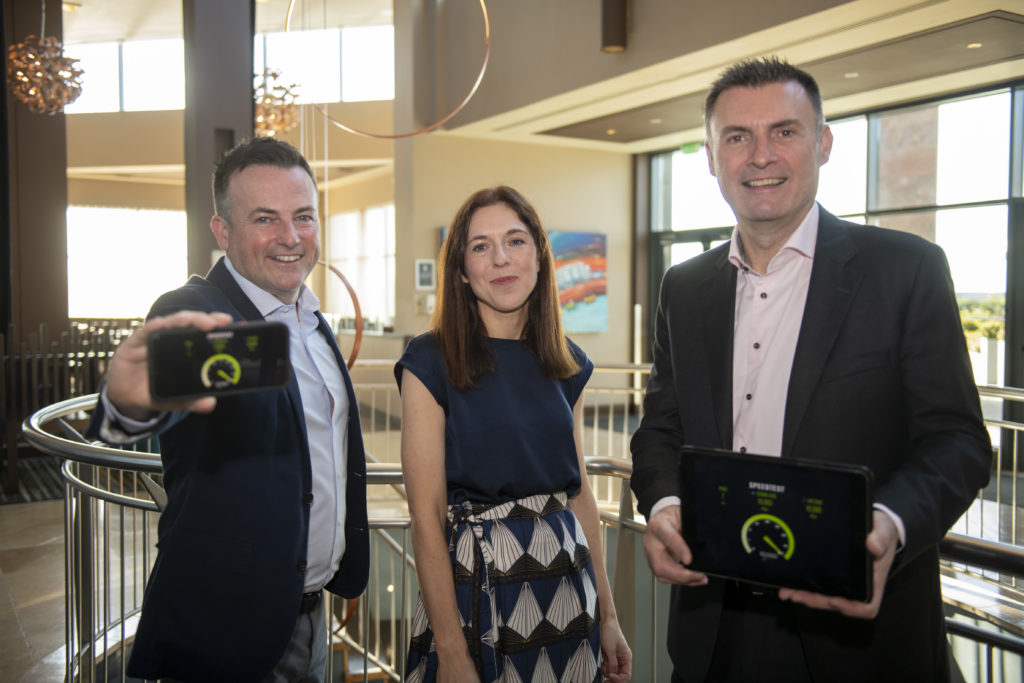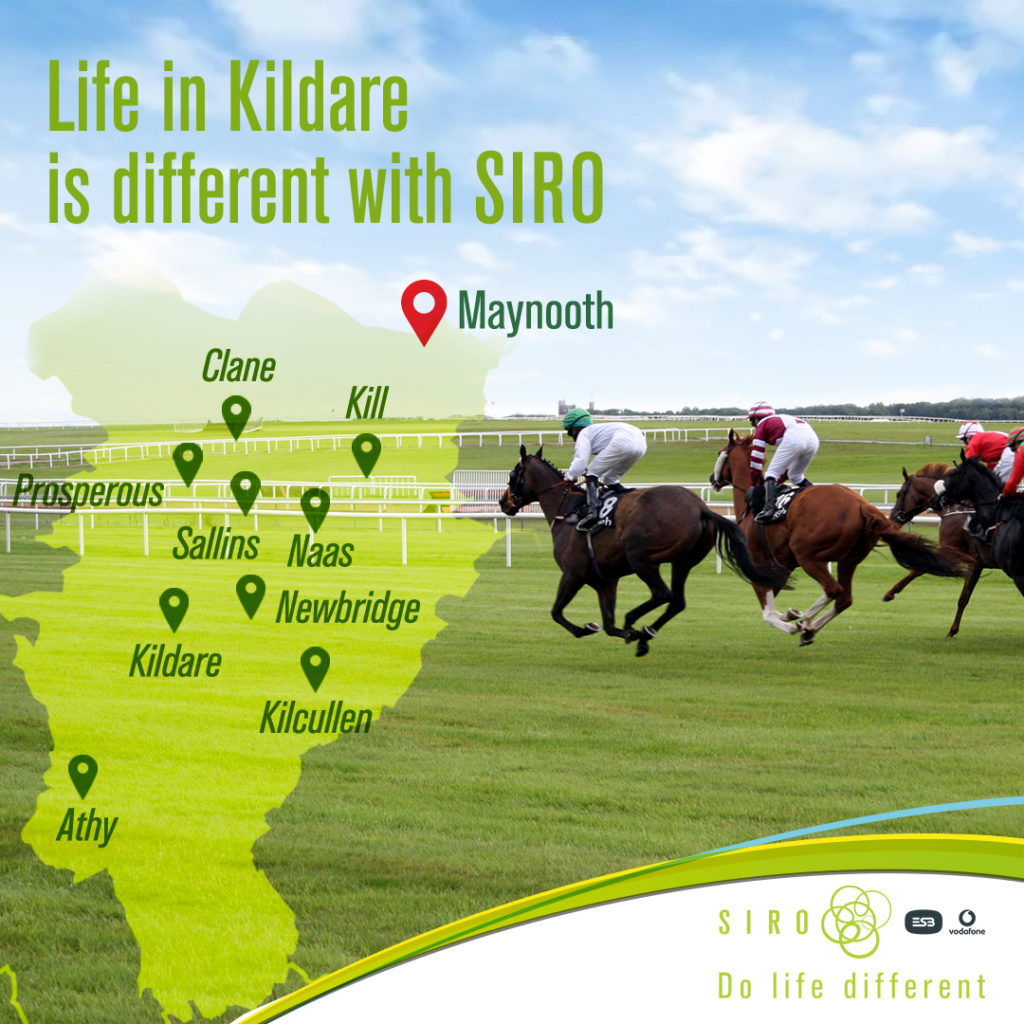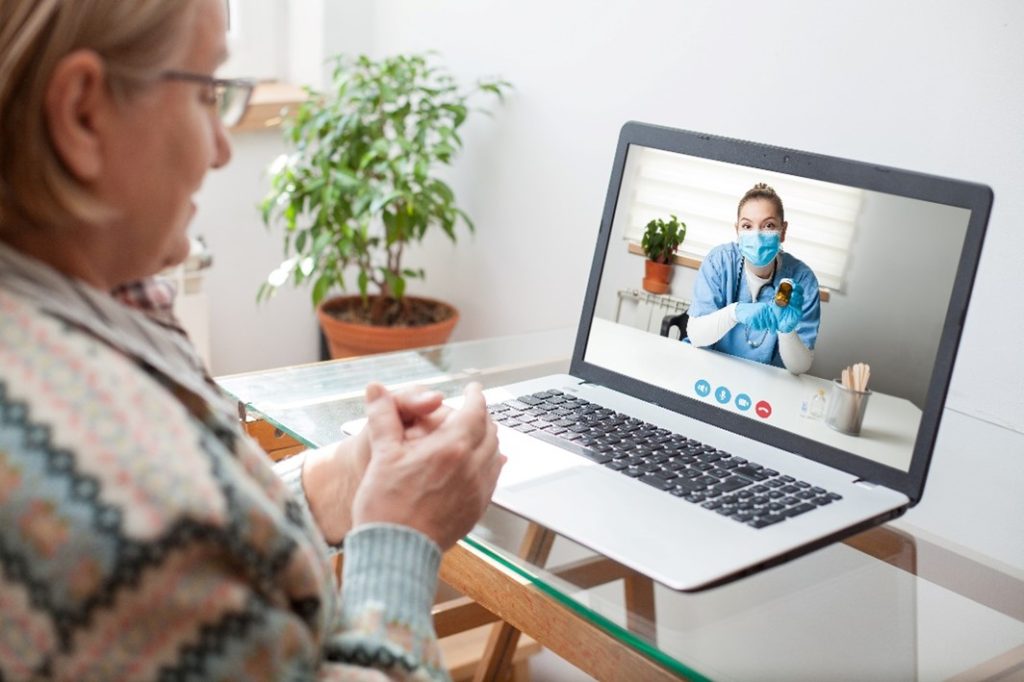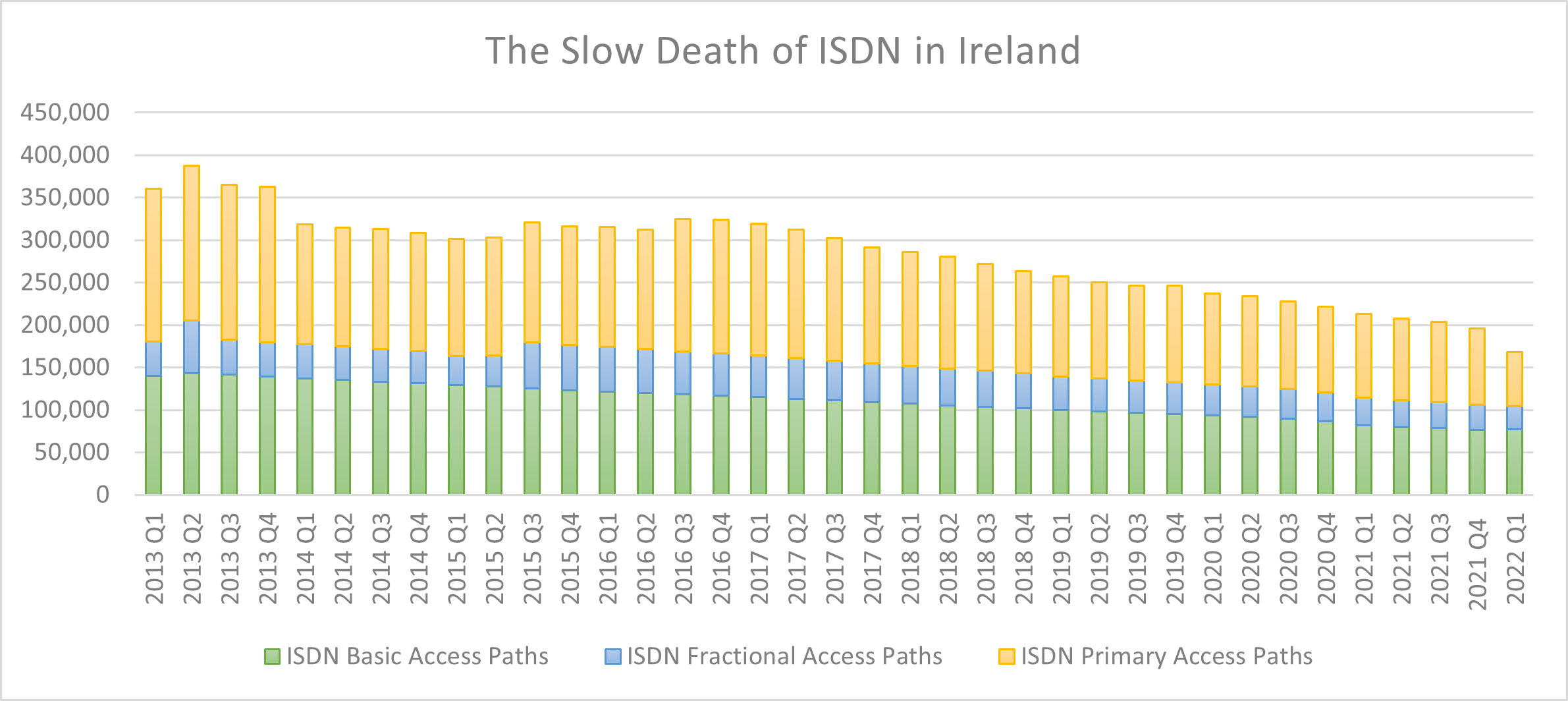 On 1 June last, SIRO launched its’ 10 Gigabit (10G) enabled broadband network in Galway city. The first city in Ireland to have this high speed, large bandwidth network at its disposal.
At the end August, SIRO’s entire fibre broadband network was upgraded to 10 Gigabits. This €10 million, 15-month upgrade project includes our full existing SIRO network, i.e., 450,000+ premises we have already passed and the further 320,000 we are in the process of passing right now.
On 1 June last, SIRO launched its’ 10 Gigabit (10G) enabled broadband network in Galway city. The first city in Ireland to have this high speed, large bandwidth network at its disposal.
At the end August, SIRO’s entire fibre broadband network was upgraded to 10 Gigabits. This €10 million, 15-month upgrade project includes our full existing SIRO network, i.e., 450,000+ premises we have already passed and the further 320,000 we are in the process of passing right now.
10G: what is it?
From the middle of last year, SIRO began the process of upgrading its’ existing network to a 10 Gigabit network using XGS-PON technology. G-PON stands for Gigabit PON or 1 Gigabit PON. The “X” in XGS represents the number 10, and the letter “S” stands for symmetrical, XGS-PON = 10 Gigabit Symmetrical PON. The upgrade allows SIRO to turbo-charge our existing network from a one Gigabit network to a network providing up to 10G connections which are symmetrical (same upload and download speeds), much more reliable, with lower latencies and better security.The point of a 10G network is the flexibility to scale up seamlessly as your data demands grow. One Gigabit to two, four, six Gigabits and so on
What can it do?
One of the most prominent and headline grabbing aspects of 10 G is speed, specifically speed of data transfer. 10 Gbps lets you transfer at a rate of 1.25 GB/s when you copy a file to another computer across the SIRO network. This equates to sending a 20 GB file in under 20 seconds. At SIRO we know, that at least for the short-to-medium term, end users of this much larger bandwidth will be enterprise/business users vs. residential consumers.
It makes sense.
It is businesses, whether small or large, who typically move large data sets. However, the number of businesses who falls into this category is not as niche as it once might have been. As ever more intensive applications run on our servers or are stored in the Cloud, the amount of data created, stored and transferred increases each day. Add in the growing automation of once manual tasks and the need for high-speed internet as the key enabler of these processes becomes clear.
At SIRO we know, that at least for the short-to-medium term, end users of this much larger bandwidth will be enterprise/business users vs. residential consumers.
It makes sense.
It is businesses, whether small or large, who typically move large data sets. However, the number of businesses who falls into this category is not as niche as it once might have been. As ever more intensive applications run on our servers or are stored in the Cloud, the amount of data created, stored and transferred increases each day. Add in the growing automation of once manual tasks and the need for high-speed internet as the key enabler of these processes becomes clear.
Speed and bandwidth are also important for business where large numbers of colleagues and clients need to connect at once. Both now have an expectation of being able to access services when they require them and that this access is dependable and consistent.10G will become the technology platform for this phase of digital adaptation across the world. It will ensure that technology in our lives becomes even more embedded and integrated
 Business, for reasons of productivity, reputation and of course the bottom line, cannot afford to have any bottlenecks in their connectivity which can hold their business back.
Businesses with many employees and multiple clients all logging on at the same time are obvious candidates for much higher speeds. Yet over recent years as our use of digital technologies has grown, it has spawned new types of business which are equally heavy data users.
Businesses in the creative sector is one example. While they may not be big in terms of employee head count, they are big users of data. Think content creators in advertising, digital or marketing agencies, animators, film or videographers, game design – all transferring large files each day. Though smaller companies, the creative sector in its’ totality is a significant sector, employing up to 5% of the Irish workforce or about 100,000.
Business, for reasons of productivity, reputation and of course the bottom line, cannot afford to have any bottlenecks in their connectivity which can hold their business back.
Businesses with many employees and multiple clients all logging on at the same time are obvious candidates for much higher speeds. Yet over recent years as our use of digital technologies has grown, it has spawned new types of business which are equally heavy data users.
Businesses in the creative sector is one example. While they may not be big in terms of employee head count, they are big users of data. Think content creators in advertising, digital or marketing agencies, animators, film or videographers, game design – all transferring large files each day. Though smaller companies, the creative sector in its’ totality is a significant sector, employing up to 5% of the Irish workforce or about 100,000.
Do I need 10G?
In truth, it depends. If you are an individual, doing video editing, streaming, audio production, activities which involve a large amount of data and if your workflow currently lags due to slow speeds, then likely you do need to move up the Gigabit ranks from the standard one Gigabit to higher speeds. The point of a 10G network is the flexibility to scale up seamlessly as your data demands grow. One Gigabit to two, four, six Gigabits and so on. The use case is much clearer if you are a business or enterprise. If your business has large file sizes to deal; you use HD streaming or your company is growing in terms of capability or headcount, then there is a real risk of congestion on your network necessitating larger bandwidth.An important additional benefit of SIRO’s 10G network is affordability. Previously access to high-speed point-to-point (P2P) services was largely just available to very big organisations with substantial IT budgets. With this upgrade SIRO have changed that market limiting dynamic.10G will become the technology platform for this phase of digital adaptation across the world.





 SIRO, a joint venture between ESB and Vodafone, is currently rolling out a 100% fibre broadband network across 154 towns and cities across Ireland, with services currently available to 450,000+ premises and reaching 770,000 premises over the next four years.
In October 2021, SIRO launched 2 Gigabit speeds for the residential market. Today’s announcement of 10 Gigabits is initially focused on the enterprise market. The latter have a need to progressively scale up their bandwidth from 2 Gigabits up to 10 Gigabits in the short to medium term.
The upgrade to 10 Gigabits reflects SIRO’s ambition to continuously bring innovation to the Irish broadband market. SIRO is Ireland’s sole open-access wholesale-only broadband operator and was first to introduce 1 Gigabit broadband to Irish homes. It is now stretching its offering further with speeds of 2 Gigabits for residential and up to 10 Gigabits for enterprise customers, respectively.
The benefits of multi-gigabit speeds include:
Ensure fastest speeds: Symmetrical speeds up to ten times faster than the best standard currently available of up to 1 Gigabit. A 10 Gigabit connection can transfer 1 Gigabit of data in 0.8 seconds or upload a file of 20 Gigabits in under 20 seconds.
Provide scalable connectivity: A future-proofed connection to support the increasing number of connected devices used by businesses.
Enhance cyber protection: Enhanced data and network protection by facilitating network management systems which reduce cybersecurity risks.
Support new technologies: The bandwidth to integrate emerging technologies, including artificial intelligence, virtual reality, 3D technology or voice recognition tools.
Commenting on the announcement, SIRO CEO, John Keaney, said:
“For SIRO, completing our transition to a 10 Gigabit-enabled network is about ensuring we continue to lead the market in terms of delivering on Ireland’s future broadband needs for the decades ahead.
“All aspects of business processes and operations are increasingly digitised. Reliable and future proofed connectivity is the foundation upon which they all rest.
“This upgrade gives enterprises the opportunity to plan and scale up their bandwidth requirements as their data demands and business requirements grow.
Rather than wait for the broadband infrastructure to catch up, businesses can now have the certainty that they can access higher speeds and capacity as and when they need it,” added Mr. Keaney.
To find out if you can avail of 10 Gigabit today, check your Eircode today!
[lookup_modal type="eircode" button-text="Search Your Eircode Today" position="mid" title="Search Your Eircode Today"]
SIRO, a joint venture between ESB and Vodafone, is currently rolling out a 100% fibre broadband network across 154 towns and cities across Ireland, with services currently available to 450,000+ premises and reaching 770,000 premises over the next four years.
In October 2021, SIRO launched 2 Gigabit speeds for the residential market. Today’s announcement of 10 Gigabits is initially focused on the enterprise market. The latter have a need to progressively scale up their bandwidth from 2 Gigabits up to 10 Gigabits in the short to medium term.
The upgrade to 10 Gigabits reflects SIRO’s ambition to continuously bring innovation to the Irish broadband market. SIRO is Ireland’s sole open-access wholesale-only broadband operator and was first to introduce 1 Gigabit broadband to Irish homes. It is now stretching its offering further with speeds of 2 Gigabits for residential and up to 10 Gigabits for enterprise customers, respectively.
The benefits of multi-gigabit speeds include:
Ensure fastest speeds: Symmetrical speeds up to ten times faster than the best standard currently available of up to 1 Gigabit. A 10 Gigabit connection can transfer 1 Gigabit of data in 0.8 seconds or upload a file of 20 Gigabits in under 20 seconds.
Provide scalable connectivity: A future-proofed connection to support the increasing number of connected devices used by businesses.
Enhance cyber protection: Enhanced data and network protection by facilitating network management systems which reduce cybersecurity risks.
Support new technologies: The bandwidth to integrate emerging technologies, including artificial intelligence, virtual reality, 3D technology or voice recognition tools.
Commenting on the announcement, SIRO CEO, John Keaney, said:
“For SIRO, completing our transition to a 10 Gigabit-enabled network is about ensuring we continue to lead the market in terms of delivering on Ireland’s future broadband needs for the decades ahead.
“All aspects of business processes and operations are increasingly digitised. Reliable and future proofed connectivity is the foundation upon which they all rest.
“This upgrade gives enterprises the opportunity to plan and scale up their bandwidth requirements as their data demands and business requirements grow.
Rather than wait for the broadband infrastructure to catch up, businesses can now have the certainty that they can access higher speeds and capacity as and when they need it,” added Mr. Keaney.
To find out if you can avail of 10 Gigabit today, check your Eircode today!
[lookup_modal type="eircode" button-text="Search Your Eircode Today" position="mid" title="Search Your Eircode Today"]  SIRO is a joint venture company between ESB and Vodafone, founded in 2015. SIRO’s state-of-the-art fibre broadband network is built on the ESB electricity infrastructure, trusted for its reliability and resilience. Overall, the company is investing more than €1 billion in delivering high speed, future proofed broadband across Ireland.
Commenting on SIRO’s launch in
SIRO is a joint venture company between ESB and Vodafone, founded in 2015. SIRO’s state-of-the-art fibre broadband network is built on the ESB electricity infrastructure, trusted for its reliability and resilience. Overall, the company is investing more than €1 billion in delivering high speed, future proofed broadband across Ireland.
Commenting on SIRO’s launch in  With the rush to the beach or getting time away after two years of COVID-induced lockdowns, you might have missed the news of Amazon’s most recent acquisition this summer.
On 21 July,
With the rush to the beach or getting time away after two years of COVID-induced lockdowns, you might have missed the news of Amazon’s most recent acquisition this summer.
On 21 July,  Amazon’s SVP of Health Services, Neil Lindsay, summed up the opportunity when he noted:
Amazon’s SVP of Health Services, Neil Lindsay, summed up the opportunity when he noted:
 Yet healthcare, particularly patient experience of accessing care, remains one of the few sectors where the impact of connectivity and digital technologies doesn’t appear to have made as much cut through.
While most activities can be booked online such as a haircut or an NCT for a car, why not an appointment with a GP? Equally, in Ireland’s hospital system there is no single digital health record for each patient to provide a catch-all record of a patient’s lifelong medical history. Instead, 85% of all hospital records remain paper-based and hospitals can’t access GP data and vice versa.
Yet healthcare, particularly patient experience of accessing care, remains one of the few sectors where the impact of connectivity and digital technologies doesn’t appear to have made as much cut through.
While most activities can be booked online such as a haircut or an NCT for a car, why not an appointment with a GP? Equally, in Ireland’s hospital system there is no single digital health record for each patient to provide a catch-all record of a patient’s lifelong medical history. Instead, 85% of all hospital records remain paper-based and hospitals can’t access GP data and vice versa.
 Integrated Services Digital Network (ISDN) first began to be used globally in the 1980s. It is effectively a set of communication standards for simultaneous digital transmission of voice, video, data and other network services over the digitalised circuits of the public telephone network. However globally, even by the end of the 1980s, the technology was already being overtaken by new network systems with much faster speeds.
However, not so the case in Ireland. Here, ISDN was introduced and billed as a step change in the digitalisation of the telephone network by Telecom Eireann in 1994, with the promise of multiple direct dial numbers (DDIs) over a single shared bearer. Originally, its capability to communicate video was also a key selling feature, with one of the original users of ISDN in Ireland being Gairmscoil Éinne on Inis Mór where pupils received their German lessons from a teacher on the mainland.
Integrated Services Digital Network (ISDN) first began to be used globally in the 1980s. It is effectively a set of communication standards for simultaneous digital transmission of voice, video, data and other network services over the digitalised circuits of the public telephone network. However globally, even by the end of the 1980s, the technology was already being overtaken by new network systems with much faster speeds.
However, not so the case in Ireland. Here, ISDN was introduced and billed as a step change in the digitalisation of the telephone network by Telecom Eireann in 1994, with the promise of multiple direct dial numbers (DDIs) over a single shared bearer. Originally, its capability to communicate video was also a key selling feature, with one of the original users of ISDN in Ireland being Gairmscoil Éinne on Inis Mór where pupils received their German lessons from a teacher on the mainland.
 From 2017 onwards the changes in Enterprise Networks and Solutions Architecture have impacted heavily on the use of ISDN access paths.
Those key changes include:
From 2017 onwards the changes in Enterprise Networks and Solutions Architecture have impacted heavily on the use of ISDN access paths.
Those key changes include:
 SIRO’s Employee Experience Manager and Executive Assistant to the CEO (Chief Executive Officer), Gillian Quigley, explores digital wellbeing apps, mental health, and the importance of staying connected.
They say these days that there’s an app for everything. An app to order food or clothes, to stream your favourite shows, and even to adjust the temperature within your home. But what about an app to improve your mental health? General wellbeing and morale over the course of the past three years has naturally dipped because of strict restrictions, lockdowns and varying levels of anxiety within society. People yearned for diverse ways to connect when the effects of loneliness in Ireland was higher than ever before.
SIRO’s Employee Experience Manager and Executive Assistant to the CEO (Chief Executive Officer), Gillian Quigley, explores digital wellbeing apps, mental health, and the importance of staying connected.
They say these days that there’s an app for everything. An app to order food or clothes, to stream your favourite shows, and even to adjust the temperature within your home. But what about an app to improve your mental health? General wellbeing and morale over the course of the past three years has naturally dipped because of strict restrictions, lockdowns and varying levels of anxiety within society. People yearned for diverse ways to connect when the effects of loneliness in Ireland was higher than ever before.  SIRO, like other companies provide apps to augment our support resources. However, you may choose to research, evaluate and use your own preferred option. There are many popular and affordable apps that don’t require intervention from your workplace. Some of these apps include ,
SIRO, like other companies provide apps to augment our support resources. However, you may choose to research, evaluate and use your own preferred option. There are many popular and affordable apps that don’t require intervention from your workplace. Some of these apps include ,  In acknowledging that digital wellbeing apps are a natural progression for health services, with more services coming online each day, it’s important to ensure that your home or business is prepared for this evolution. SIRO’s fibre to the premises broadband is a ‘one size fits all’ type of connectivity that’s resilient enough to handle any video calls, heavy data uploads without a break in signal, when using cloud-based health platforms.
The pandemic has shown us that connectivity matters now, more than ever before. Staying connected with your friends, family and your own self is vital to having a positive, healthy state of mind.
If you or someone you know are experiencing mental health issues, please contact:
In acknowledging that digital wellbeing apps are a natural progression for health services, with more services coming online each day, it’s important to ensure that your home or business is prepared for this evolution. SIRO’s fibre to the premises broadband is a ‘one size fits all’ type of connectivity that’s resilient enough to handle any video calls, heavy data uploads without a break in signal, when using cloud-based health platforms.
The pandemic has shown us that connectivity matters now, more than ever before. Staying connected with your friends, family and your own self is vital to having a positive, healthy state of mind.
If you or someone you know are experiencing mental health issues, please contact:  The hospitality industry is a vital element of the Irish economy, with the
The hospitality industry is a vital element of the Irish economy, with the 
